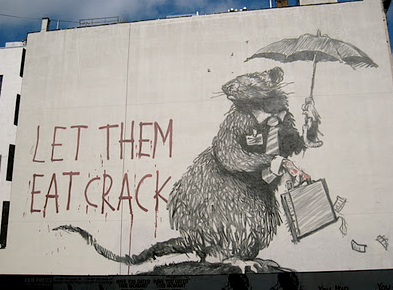Obama Can Do More on Oil Prices
 By Ralph Nader
By Ralph Nader
Gasoline and heating oil prices are ratcheting up. In California, some motorists are paying over $5 per gallon. President Obama declared that "there is no quick fix" for this problem. Meanwhile, the hapless but howling Republicans are blaming him for the fuel surge as if he is a price control czar.
Indeed, President Obama has some proper power to cool off retail petroleum prices. David Stockman, President Ronald Reagan's Budget Director, said it plainly on CNN last week, "Stop beating the war drums right now [against Iran], and Obama could do that, and he could say the neocons are history." Having done his stint on Wall Street, Stockman knows that war talk by the war hawks inside and outside of our government is just what the speculators on the New York Mercantile Exchange want to hear as they bid up the price. Your gasoline prices are not charging up due to strains between supply and demand. Speculation, with those notorious derivatives and swaps, is what is poking larger holes in your fuel budget, according to Securities and Exchange Commission enforcement lawyers. The too-big-to-fail Wall Street gamblers – Goldman Sachs, JP Morgan Chase, Bank of America, Merrill Lynch, and Morgan Stanley – are at it again.
Last June, the Commodity Futures Trading Commission (CFTC) Chairman, Gary Gensler, declared in New York City that "huge inflows of speculative money create a self-fulfilling prophecy that drives up commodity prices."
Mr. Gensler and the CFTC received more legislated authority to police these Wall Street gamblers, but key members of Congress refused to give him a budget to, in his words, "be a more effective cop on the beat," at a time of sharply-increasing trading volume. Congressional campaign budgets are being swelled by campaign contributions from those very Wall Street gamblers. This is called "cash-register politics." Meanwhile, you the people pay and pay at the pump and wonder why no one is doing anything about it.
But an inadequate budget only explains part of Mr. Gensler's problems. He is continually undermined by other CFTC Commissioners who do not want real enforcement action. He also seems to be wearing down under the pressure.
Back in the 1970s, a sudden increase in gasoline prices – even a few cents – led to an uproar among consumers and demands for regulation, price controls and other government action. Now that the New York Mercantile Exchange, with its big banking and hedge fund speculators loading up on fat profits and bonuses is right here in the U.S., officials are throwing up their hands saying "there are no quick fixes."
Yet by the constant Israeli-Obama-Hillary Clinton-Congressional-AIPAC belligerent talk about Iran developing a capability to produce nuclear weapons is provoking Tehran's warnings about the Straits of Hormuz, and the oil price speculators are having a field day with your gas dollars.
Senator Bernie Sanders (I-Vt.) regularly demands that that Obama's regulators impose limits on oil speculations. He asserts that the "skyrocketing price of gas and oil has nothing to do with the fundamentals of supply and demand." Even Goldman Sachs analyst, David Greely, claimed Wall Street speculation in the futures market is driving up oil prices.
In response to such clamorings, President Obama announced in April 2011 a new inter-agency working group to combat fraud. Don't hold your breath waiting for any action here.
So why doesn't President Obama invite the various industries such as the trucking and airline companies that are hurt by spiraling oil prices, together with consumer groups, motorist organizations, such as AAA and Better World Society, and the relevant government agencies to generate the pressure on Congress and the recalcitrant members of the CFTC to stop fronting for the Wall Street casino giants?
Mr. Obama and Energy Secretary Chu keep saying that there is enough oil in world markets and that speculatively-driven higher oil prices are undermining the U.S. economic recovery. Yet Mr. Obama seems unwilling to fully use his administration's existing authority to crack down on the surging speculation.
There is much more action possible under current statutory authority for the regulators to use and earn their salaries. They need to hear louder rumblings from the people. While the people need, whenever possible and safe, to walk short distances instead of drive there, if only to stiffen their determination to fight back in more than one way.



